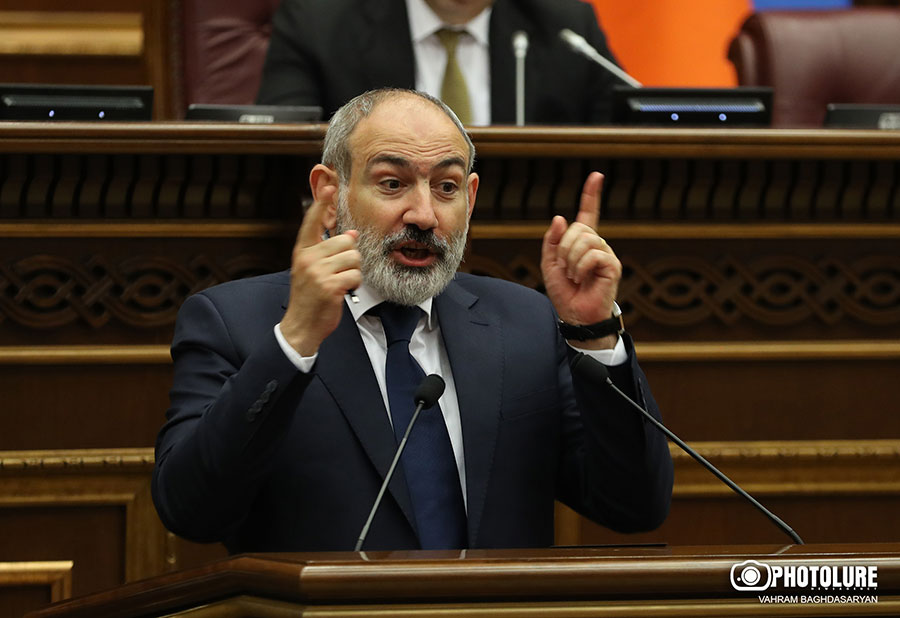Prime Minister Nikol Pashinyan on Friday again threatened to crack down on Nagorno-Karabakh’s exiled leaders, saying that they are encouraging Karabakh Armenian refugees to participate in antigovernment protests in Yerevan.
Pashinyan already voiced such accusations earlier this week during two days of heated parliament debates held amid a standoff outside the Armenian parliament building between security forces and protesters demanding his resignation. He repeatedly lashed out at Karabakh’s current and former leaders, including those jailed in Azerbaijan, saying that they, rather than his administration, are to blame Baku’s recapture of the region last September.
Pashinyan alleged that Karabakh forces did not fight back the Azerbaijani offensive because the authorities in Stepanakert as well as the Armenian opposition wanted the region’s population to flee to Armenia to topple him. He also lambasted Karabakh generals critical of him.
“They are cowardly deserters, cowardly deserters, cowardly deserts,” he shouted on the parliament floor on Wednesday, provoking furious reactions from opposition lawmakers.
Read also
Samvel Shahramanyan, Karabakh’s Yerevan-based president, rejected Pashinyan’s allegations on Thursday.
“The people of Artsakh held out not for two hours but for 32 years, and every Artsakh child over the age of 7 has seen three large-scale wars,” Shahramanyan told reporters. “As regards the last [Azerbaijani] actions, I have already said in my speeches that within hours we realized that we are alone, that resisting the Azerbaijani armed forces outnumbering us by a factor of 12 to 1 was not possible and we had to save lives.”
At least 198 soldiers and 25 civilian residents of Karabakh were killed during the 24-hour hostilities. The Azerbaijani Defense Ministry acknowledged around 200 combat deaths among its military personnel involved in the operation. Baku stopped the operation and allowed the region’s entire population to flee to Armenia after Shahramanyan’s administration agreed to disband the Karabakh army and surrender its weapons.
Shahramanyan on Thursday also criticized Armenian riot police for using “disproportionate force” against the antigovernment protesters led by Archbishop Bagrat Galstanian. What is more, he declared that the Karabakh refugees have a “legal and moral right” to participate in peaceful demonstrations “because we believe they are also citizens of Armenia.”
Pashinyan hit out at Karabakh’s “clerical-feudal elite” during a cabinet meeting held the following day.
“We are very patient and tolerant … but nobody should perceive this as a government weakness,” he said. “Yesterday, I had the opportunity to say this from the podium of the National Assembly. I hope that the recipients of these messages will accept these messages and not force us to deliver, so to speak, these messages to specific addresses.”
The Armenian authorities have already cracked down on at least three Karabakh leaders who signaled last month support for Galstanian’s protest movement. The exiled mayors of Stepanakert and the northern Karabakh town of Martakert were arrested later in May. They as well as another Karabakh mayor, who was placed under house arrest, deny fraud and forgery charges levelled against them.
Shahramanyan spoke to the press outside a court in Yerevan that agreed on Thursday night to move the Stepanakert mayor, Davit Sargsyan, to house arrest. He described the criminal case against Sargsyan as “political persecution.”
Pashinyan already issued a similar warning to Shahramanyan in March after the Karabakh leader said that the self-proclaimed Nagorno-Karabakh Republic continues to exist despite the Azerbaijani control over the region.
Artak Beglaryan, a former Karabakh premier also supporting the protest leader, condemned Pashinyan’s latest threats, saying that the Armenian premier and his political allies are spreading hate speech against the Karabakh Armenians.
“They offend not only the people of Artsakh but also a large part of the Armenian people for whom Artsakh is one of the important pillars of identity,” Beglarian told RFE/RL’s Armenian Service.

























































